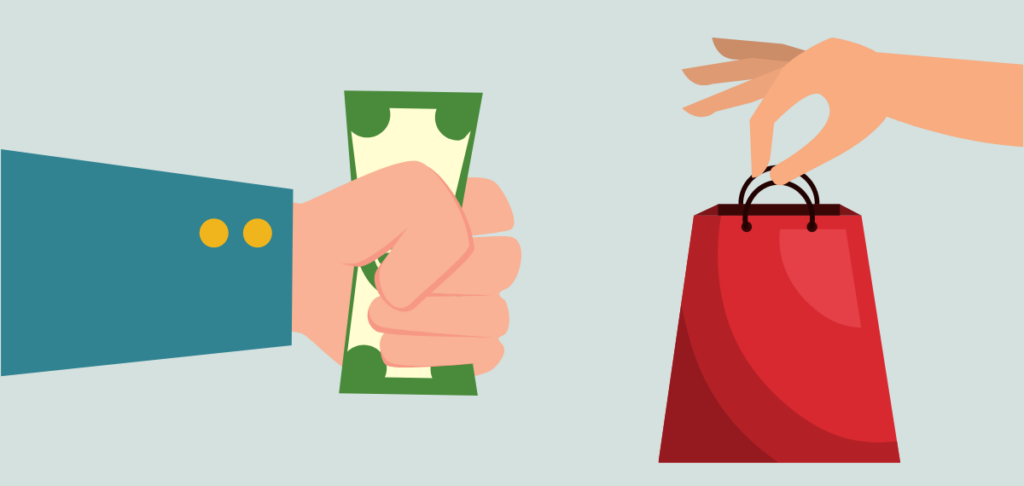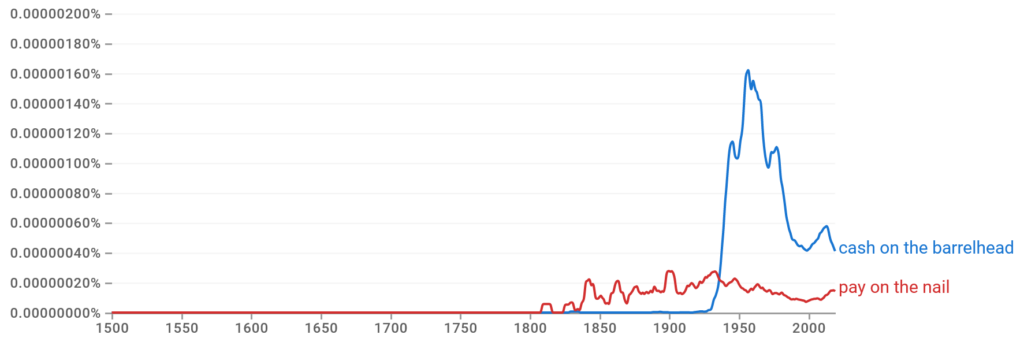Cash on the barrelhead basically means immediate payment. This means no credit, no delay, nada. It’s just a straightforward, no-nonsense way of doing business.
Idioms like cash on the barrelhead are expressions whose meanings go beyond the literal interpretations of their individual words. They play a crucial role in the English language by injecting interest into our conversations and writings. These expressions encapsulate cultural history and serve as concise tools to convey complex ideas in easily understandable phrases.
However, cash on the barrelhead isn’t just a saying; it’s a reflection of an era and a way of doing business that values immediacy and clarity. Even though it’s an older, less common expression these days, it’s still important to understand where it came from and how to use it properly.
So, my guide covers details about its meaning, origin, and proper usage. It also shares helpful tips for effective usage, sentence examples, variations, and related terms and phrases. So, let’s jump into the world of trade and transactions!

What Does the Idiom Cash on the Barrelhead Mean?
The idiom cash on the barrelhead means immediate payment or settlement, typically requiring payment in cash at the time of a transaction. This idiom is rooted deeply in American vernacular to convey the urgency and necessity of payment at the time of purchase. It’s as if you’re placing your cash right there on the barrel’s head, ready for the transaction to be completed promptly.
Collins Dictionary says, “If you pay cash on the barrelhead or on the barrel for something, you pay for it immediately and in cash.” Or, in simpler terms, it means immediate payment, according to Dictionary.com.
We use the expression to stress the importance of direct, upfront payment, which usually implies that no credit or deferred payment will be tolerated or accepted. The phrase paints a picture of someone placing money directly on a barrelhead (the flat end of a barrel), which in the past might have served as an impromptu counter or table in general stores.
When I first learned of this phrase, I immediately whipped open my Notes app and added it to my list of ideas for my fantasy books. It’s an old-fashioned saying, but it would make such a great addition to my time-traveling pirates’ series as a line from one of the characters.
Literal Meaning vs. Figurative Meaning
The literal meaning of cash on the barrelhead would involve someone physically putting money on the flat surface of a barrel, which ties into its origin (more on that in a second). However, figuratively, it means paying on the spot or upfront for any goods or services.
Variations of the Idiom
Cash on the barrelhead is the most commonly known version, but there are slight variations out there:
- Cash on the nail (British version)
- Cash on the barrel
- Money on the barrel
These are also used in some regions and contexts, alluding to the same sense of immediate payment.
How Is Cash on the Barrelhead Commonly Used in Context?
The phrase cash on the barrelhead is used in many different contexts, but mostly in business or any transactional scenario. You can use it whether discussing a car purchase, a service fee, or buying goods from a local market because it’s a phrase that emphasizes the importance of paying upfront and in full.
In the following sections, we’ll delve into different ways to use it, offer tips for effective usage, and provide real-life examples that illustrate its application.
What Are the Different Ways to Use the Idiom Cash on the Barrelhead?
- Business transactions: When an item can only be purchased with money upfront. “We only accept cash on the barrelhead for this item, no credit terms.”
- In personal agreements: Making deals with friends for their help or services. “If you can properly fix my roof by this weekend, I’ll give you cash on the barrelhead.”
- Everyday scenarios: For any time that cash is preferred. “At the craft fair, vendors prefer cash on the barrelhead rather than any other payment method.”
What Are Some Tips for Using Cash on the Barrelhead Effectively?
- Understand the context: It’s usually used in situations requiring immediate payment.
- Be clear: Make sure the other party understands the idiom’s meaning and the expectation of upfront payment.
- Use it for emphasis: It’s a great way to stress the urgency or importance of immediate payment.
Where Can You Find Examples of the Idiom Cash on the Barrelhead?
This idiomatic expression appears in a few forms of media, from classic literature to modern films, usually in scenes emphasizing quick and immediate transactions.
It’s the title of the iconic 1956 honkey-tonk song by the Louvin Brothers—a song that’s been redone and covered by artists such as Alison Krauss, Dolly Parton, and Gram Parsons.
Aside from acting as a quirky name for things, it’s also a phrase that’s been quoted in news and media, like these examples:
A brutally tough wartime U.S. administration required Britain to pay cash on the nail for every ton of arms shipped across the Atlantic to assist our lonely struggle for survival. (The Daily Mail)
That “goes to show that most fliers will forgive and forget if you back apologies with cash on the barrel.” (USA Today)
What Is the Origin of the Idiom Cash on the Barrelhead?

The idiom cash on the barrelhead originated in the United States during the early 20th century. However, it evolved from a much older version of the phrase cash on the nail, a UK phrase from the 1500s.
The newer American version came from the fact that taverns would sometimes use barrels for seating and tables, and some places required you to pay for your drinks upfront or leave coins on the barrelhead.
The UK version, cash on the nail, comes from an Anglo-Norman saying payer sur le ungle, which translates to pay on the nail.
Some say this refers to fingernails, so paying upfront would mean having the cash at the tips of your fingers. Others have stated that the phrase actually relates to the beautiful bronze pillars found in Bristol where (apparently) men would sit and do business in the streets.
You can find an early use of the phrase in print in “The City-Madame,” a comedic play by Phillip Massinger written in 1632, “And it comes timely; For, besides a payment on the nail for a manor late purchased by my master, his young daughters are ripe for marriage.”
How Did the Idiom Evolve Over Time?
Even today, the phrase’s essence remains the same. However, its use has expanded beyond literal barrels and into a broader range of transactions and agreements, symbolizing the enduring value of clear, immediate exchange.
What Are Some Related Terms to Cash on the Barrelhead?
Old-fashioned terms like this don’t always work in modern contexts, so try one of these alternative phrases to cash on the barrelhead.

Synonyms
- Pay upfront
- Direct payment
- Payment first
- Cash-only
- Immediate payment
- On-the-spot payment
Antonyms
- On credit
- Deferred payment
- Layaway
Cash on the Barrelhead: Test Your Knowledge!
Choose the correct answer.
What Have We Learned about Cash on the Barrelhead?
Cash on the barrelhead is an idiom that sums up the demand for immediate payment and reflects a straightforward approach to business transactions. Understanding this phrase will help you appreciate not only the history of commerce but also the colorful ways our language captures such specific actions and agreements.
Now that we’ve covered the deeper meaning, origin story, variations, alternatives, and examples, you’re equipped with the knowledge to use this idiom. Keep learning about more fun idioms like this one from the guides on our site!
Related Articles:
